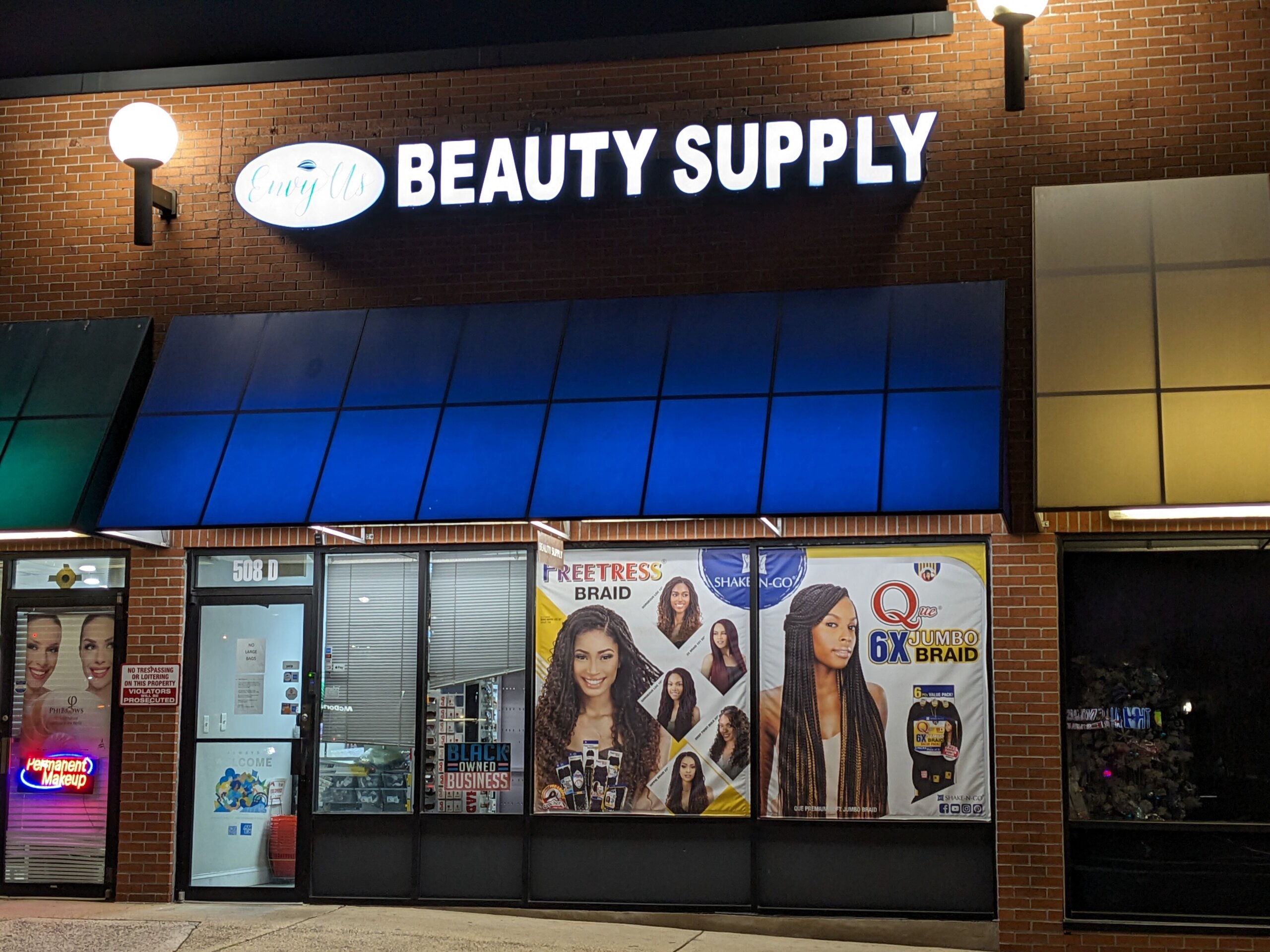Joanne Wunderly got a dreaded call one morning two years ago that there had been a break-in at her Manassas, Virginia, store and the burglar made off with the cash register.
Not only was the register gone, so was the cash box, the week’s deposit, and some jewelry that she sells in her store The Things I Love.
“I think I was more angry than anything,” Wunderly said. “I’ve worked so hard, and we all do as small businesses … and you walk in and somebody just thinks they have the right to come in and just take whatever they want from your personal space.”
Retail theft is on the rise in the D.C. area and nationwide. Shrink — a term used by retailers to identify inventory loss — accounted for $112.1 billion in losses in 2022, according to the National Retail Federation, an association that represents department stores, restaurants, grocery stores and other companies that provide goods and services.
NRF said the average shrink rate in 2022 increased to 1.6%, up from 1.4% the previous year.
“I’ve worked so hard, and we all do as small businesses … and you walk in and somebody just thinks they have the right to come in and just take whatever they want from your personal space.”
Wunderly not only lost about $4,000 in stolen goods and cash; she also lost time, having to close her business until she could get a replacement cash register, which took a couple of days.
Kevin McIntyre runs Samson Protection Services, a property protection company that serves the D.C. region. He confirmed that he has seen an uptick of retail thefts.
“As the economy gets a little worse, I think people are just feeling hopeless,” McIntyre said. “They figure, ‘Hey, that’s low-lying fruit for me. I can go in the store, steal some items, steal some food, steal some clothes,’ and then they’ll sell it.”
In Wunderly’s case, the thief tried to sell bracelets taken from her store and that’s how authorities found and caught the thief.
It was the first break-in Wunderly experienced in her 27 years running the business in Old Town Manassas, and while she has had shoplifters from time to time, it doesn’t happen often, she said.
That’s not what small business owner Aesha Ray has been seeing recently at her stores in Alexandria and Fort Washington, Maryland. Ray opened Envy Us five years ago in Alexandria, selling a variety of beauty supplies mainly focused on ethnic hair care. Her Maryland location opened in February. She said she has seen a huge uptick in thefts in the last year, compared to the year before.
“Initially, we were seeing a theft at least once a month. Now, it’s starting to feel like every two weeks to every week,” Ray said, which she also attributed to a “troubling economy.”

Stealing for street credit
While some may steal necessities, such as food to eat or detergent, others try to make money off the stolen goods. Then there are those who do it for the notoriety.
Sgt. Calvin Charles, from the Maryland-National Capital Park Police, has been an officer for 29 years. He often talks to merchants and community members about the thefts that have plagued Prince George’s County.
“What we’re learning is they’re stealing to … be known as the person that you go to,” Charles said. “This person, they can get it out there for you … from food or detergent. They want to have … that prestige on the street. They want to have street credit,” Charles said.
He said sometimes the thieves post the illicit goods on social media: “Yes, they brag about it.”
Charles said building better communication between store owners, customers and officers is key, along with educating people about why stealing is not good for the community and the resources available to them for their needs.
“People don’t realize that Prince George’s County has resources. So, if you don’t have food, if you don’t have detergent, we have resources in Prince George’s County … if you don’t have it, you can get help,” Charles said.
The cost of doing business
With seemingly no quick solution to the recent rise in crime, many small businesses are considering hiring security.
McIntyre suggested the cost could outweigh the inevitable rise in insurance premiums after a break-in, the inventory loss, the amount to replace and repair damages and to install security cameras.
But it can take a big bite out of a small business’ budget.
Axios reported that many restaurants in D.C. have been using expensive security details, with one restaurant chain increasing its security spending to around $200,000 a year.
McIntyre’s unarmed guards wear police style, or tactical uniforms, dark blue or black in color with badges, hats, coats and a duty belt. Some are outfitted with OC (pepper) spray and batons.
“All of those things are designed to let bad guys know, ‘Hey, don’t do it here,'” McIntyre said. “The entire uniform of the guard is designed for a deterrent. We want people to stay away and go, ‘We won’t try this place. It’s just too much trouble.'”
But what can they do when there is trouble? And what should store owners do?
Sgt. Lamar Robinson with the Prince George’s County Police Department encouraged employees and shop owners not to try and stop people who are stealing because it might “escalate into something in which somebody can get hurt, or even seriously injured.”
McIntyre said he does not want his guards to get into anything physical. Even the armed guards wear their guns for personal protection and to protect someone in danger — not to stop someone from stealing.
“They really can’t do anything but use their voices and serve as a deterrent. But it’s a very, very effective deterrent,” McIntyre said, adding that security guards have no authority to arrest or detain in Maryland. They can make a citizen’s arrest, which he said is high risk. “We tell them, if at all possible, don’t even think about doing that.”
“No amount of clothing or product is worth your health or your life. Just call the police as soon as you can.”
Instead, McIntyre said the guards have to resort to a “lower force method” to deal with a threat, such as using their voice or pulling their baton. In Maryland, “they can’t do much more than a person with no weapon,” he said.
As for employees witnessing someone stealing from the store, McIntyre’s advice is to stand down. Don’t try to snatch the clothes or fight them, McIntyre said, because you just never know what that individual could do.
“No amount of clothing or product is worth your health or your life,” McIntyre said. “Just call the police as soon as you can.”
Emotional toll, community impact of small business theft
Ray estimated she has lost about $2,000 in the past year from theft, and it’s hard not to take it personally.
“It’s a lot for a small-business owner because we’re usually bootstrapping our businesses,” Ray said. “We don’t have investors; we don’t have heavy financing because we are investing in these businesses from our own personal savings … So it does hurt because every little bit matters to a small business.”
Ray said she started her business to serve her community, bringing more jobs and better access to the type of beauty supplies and personal care that’s difficult to find in other places.
“It’s really disheartening for the same community that we set out to serve to then turn around and conduct these acts against us,” Ray said. “I think it’s probably more hurtful that they’re comfortable doing this to us and to the people that I employ, than it hurts to lose the money. So I wish people were more mindful of that.”
Persistent theft could lead to businesses closing shop. According to a recent National Retail Foundation survey, some 28% of retailers nationwide have been forced to close a specific location, 45% said they reduced operating hours, and 30% have had to change their in-store selection because of crime.
“We don’t have investors; we don’t have heavy financing because we are investing in these businesses from our own personal savings … So it does hurt because every little bit matters to a small business.”
Charles said one solution to deterring theft may be found in the very same community where it is happening, and it would take everyone working together. He advises small businesses to get to know the local schools and rec centers and to give back. But he said the community also needs to give back to small businesses.
“This way, it becomes a buy-in from the community, and [businesses] also become a pillar in the community,” Charles said.
That’s what happened after the break-in at Wunderly’s store. When she reopened her store, customers came en masse and just “shopped, shopped, shopped,” with some customers leaving extra money, Wunderly said.
Other merchants in town pitched in, some holding raffles and giving a portion of their day’s sales to Wunderly. One fellow business owner even handed her a check while she was eating at his restaurant. Pretty soon, she recovered the entire $4,000 that was stolen.
“It was truly amazing. I really mean, from a horrible thing that happened, it was something that opened your eyes up to something really, really beautiful. I’m so proud to be a part of a community like this,” Wunderly said.








